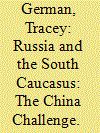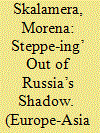|
|
|
Sort Order |
|
|
|
Items / Page
|
|
|
|
|
|
|
| Srl | Item |
| 1 |
ID:
188302


|
|
|
|
|
| Summary/Abstract |
Following the 2014 Ukraine crisis, Belarus and Kazakhstan appear caught in an alliance security dilemma characterised by intra-alliance threat and entrapment, as both are potential targets of militarised hybrid warfare by their vastly more powerful ally, Russia. Despite having sought foreign policy flexibility between the two increasingly opposed geopolitical camps of the West and Russia, Minsk and Nur-Sultan appear drawn further towards Moscow. Utilising their pre- and post-2014 national security documents, reinforced by an examination of their rhetoric and policies, this essay demonstrates how both countries reassessed their security environment in the wake of the annexation of Crimea and the initial war in the Donbas region.
|
|
|
|
|
|
|
|
|
|
|
|
|
|
|
|
| 2 |
ID:
188296


|
|
|
|
|
| Summary/Abstract |
A widespread argument in regionalism studies is that elite narratives are crucial for strengthening regional integration projects. The essay shows that this conjecture does not hold in the case of Eurasian regionalism. Russian elites demonstrate a very high level of rhetorical commitment to regionalism. However, Russia’s rhetoric is characterised by a permanent dissonance. Officially, Russian elites highlight the equality of all participants in regional arrangements and respect for their sovereignty. At the same time, Russian politicians and bureaucrats regularly make imperialist statements to placate domestic audiences. As a result, most framings of Eurasian regionalism that can be derived from Russian discourses are highly unappealing to other post-Soviet states.
|
|
|
|
|
|
|
|
|
|
|
|
|
|
|
|
| 3 |
ID:
188298


|
|
|
|
|
| Summary/Abstract |
Deference to Chinese aspirations in Eurasia is integral to Moscow’s pursuit of closer relations with Beijing. Yet China’s pursuit of regional, and ultimately global, influence is at odds with Russia’s longstanding ambition to maintain post-Soviet Eurasia as a strategic glacis and sphere of ‘privileged interests’. Russia has consequently sought to shape and channel Chinese engagement in line with its own interests, with mixed results. Disappointments with the effects of Chinese economic and political influence on Russian equities, limits on Sino–Russian coordination, and the interest of Eurasia’s smaller states contributed to a growing wariness on Russia’s part. The 2022 invasion of Ukraine and attendant confrontation with the West have left Russia more dependent on China, even as China itself has become more realistic about the prospects for Eurasian integration.
|
|
|
|
|
|
|
|
|
|
|
|
|
|
|
|
| 4 |
ID:
188300


|
|
|
|
|
| Summary/Abstract |
This essay explores the regional rivalry between Russia and Turkey from the former’s annexation of Crimea in 2014 to its invasion of Ukraine in February 2022. The main argument is that Russia and Turkey have maintained a managed regional rivalry. The two have continuously supported opposing sides in regional conflict theatres. At the same time, Russia and Turkey have learned to accommodate the interests and spheres of influence of each other and cooperate through various bilateral mechanisms. The essay concludes that a form of managed regional rivalry will continue to shape Russian–Turkish relations in Eurasia in the foreseeable future.
|
|
|
|
|
|
|
|
|
|
|
|
|
|
|
|
| 5 |
ID:
188294


|
|
|
|
|
| Summary/Abstract |
The Russian invasion of Ukraine in February 2022 has caused a massive humanitarian crisis. As of this writing, thousands of people have lost their lives, and many more seem destined to die. Moreover, nearly 2.5 million Ukrainians have fled their country, a number that will grow considerably if the war continues. Beyond the human suffering and misery it entails, the conflict has shaken the foundations of Europe’s security order. Western governments have scrambled to ramp up their defensive expenditures, imposed severe economic and political sanctions on Russia, and upped their supply of weapons to Ukraine. The Kremlin, in turn, has shown no signs of backing down. On the contrary, the Putin government has issued thinly veiled nuclear threats and warned Western leaders not to impose a no-fly zone over Ukraine. Though it is still too early to know how the conflict will end, it is already clear that Europe will not be the same after the war. How could this happen?
|
|
|
|
|
|
|
|
|
|
|
|
|
|
|
|
| 6 |
ID:
188297


|
|
|
|
|
| Summary/Abstract |
Russia has sought to maintain its influence in the South Caucasus by a variety of means, viewing the region as an area of crucial importance for its core strategic interests. However, China’s prominence in the South Caucasus has increased significantly over the past decade, as the South Caucasus states seek to diversify their diplomatic and economic ties. This essay explores whether Russia’s regional hegemony in the South Caucasus is being challenged by China: does China’s growing engagement with the states of the South Caucasus pose a challenge to Russian influence within its traditional zone of ‘privileged interest’?
|
|
|
|
|
|
|
|
|
|
|
|
|
|
|
|
| 7 |
ID:
188295


|
|
|
|
|
| Summary/Abstract |
The essay analyses Russia’s historical goals in Eurasia and argues that the geopolitical meaning of Russia’s annexation of Crimea is closely related to the Kremlin’s ambition to play a key role in structuring the region. Russia’s determination to remain a major power, along with the global power transition from the West-centred to an increasingly regionalised world, make Russia’s return to Eurasia important. The return to Eurasia has demonstrated its promise to facilitate increased commercial relations within the Eurasian Economic Union (EAEU) as well as with China and other Asian countries. The future of Eurasia and Russia’s role in the region remain uncertain, however, because major participants are yet to align their visions of Eurasia, while Russia itself has yet to consolidate its internal economic and state capabilities.
|
|
|
|
|
|
|
|
|
|
|
|
|
|
|
|
| 8 |
ID:
188299


|
|
|
|
|
| Summary/Abstract |
This essay analyses the evolving character of Russia’s energy relationships in the post-Soviet space by looking at the Caucasus and Central Asia. In the past, due to the historic legacy of Russia-controlled pipelines, Moscow was able to exert influence by manipulating structural asymmetries in regional natural gas value chains. This has changed with China’s entry as the region’s major market alternative and the breakthroughs of the global energy transition. The initial phase of Russia’s declining ‘energy power’ vis-à-vis China in Central Asia came to an end as the Crimea crisis was unfolding, an event that has drastically changed the risk perception of Russian gas in Europe, setting off a chain of consequences that led to a re-evaluation of Russia’s energy power in post-Soviet Eurasia. The essay also shows, however, that Russia maintains influence in post-Soviet Eurasia through inter-elite networks and shared concerns among hydrocarbon-exporting countries about the energy transition.
|
|
|
|
|
|
|
|
|
|
|
|
|
|
|
|
| 9 |
ID:
188303


|
|
|
|
|
| Summary/Abstract |
This essay complements the other contributions to this special issue by placing Russia’s neighbourhood policy into a broader temporal and theoretical perspective. It shows that Russia’s political elite during the last three decades has been largely united behind the goal of establishing a Moscow-centred regional security order. Yet, despite this broad-based consensus, Russia’s policy in the former Soviet area has varied markedly across time and space. To account for this pattern, the essay develops and tests a neoclassical realist approach that explains why, how and when major powers such as Russia pursue regional primacy.
|
|
|
|
|
|
|
|
|
|
|
|
|
|
|
|
| 10 |
ID:
188301


|
|
|
|
|
| Summary/Abstract |
Drawing on the theory of script formulations, this essay explores why, in 2013–2014, the EU and Russia clashed over Ukraine but not over Armenia by analysing the evolution of discursive dynamics and the attribution of accountability between both actors. It argues that the positions of Russia and the EU were not simply a function of a priori defined strategic interests and expectations but were codetermined by and through the events and actions of others. The essay contributes to a better understanding of the non-linear dynamics behind the escalation of tensions between the EU and Russia.
|
|
|
|
|
|
|
|
|
|
|
|
|
|
|
|
|
|
|
|
|